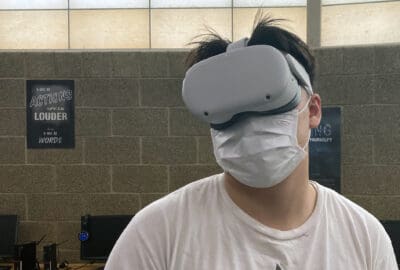

Immersive Learning Powers 21st-Century Student Skill Building
September 20, 2021
At a Glance
SAP and JFFLabs’ Immersion Skill Labs prove immersive learning’s impact on core communication skills.
As students return to learning, many schools are leveraging the digital tools and practices they adopted during the pandemic.
In last year’s sink-or-swim education environment, many educators “swam” by experimenting with new ways to deliver content. Obstacles to innovation were overcome faster than before, and educators were offered novel opportunities to experiment with digital tools and develop new skills to apply to their instructional design and teaching practice.
In the spirit of engaging and supporting these frontline pioneers of education, SAP and JFFLabs launched the Skill Immersion Lab with three partner sites serving students ages 14-20. These sites are diverse in geography, school model, and program delivery. We recognized the potential of virtual reality (VR) as a powerful digital teaching and learning tool, and provided best practice guidance and wrap-around implementation support to instructors. The initial results of this pilot have provided early evidence of positive impact on learners’ skill development, and we are excited to observe sustained integration at these program sites and the expanded impact as we scale.
VR Learning for Future Leadership
The program utilized VR software designed to strengthen communication skills, developed by spatial computing company and JFFLabs immersive learning partner Talespin. The modules included “Leading Through Uncertainty” and “Effective Feedback” and have been designed to help learners practice fundamental communication and interpersonal skills required of leaders. These include other awareness, communicating succinctly, purposeful inquiry, managing frustration, deescalation of conflict, compromise, and encouragement.
Early indicators featured in an article on ZDNet confirm that VR can be effective in equipping students with skills that will help prepare them for the dynamic working and learning environments of today and tomorrow. Initial findings conclude that immersive learning:
Immersive Learning
Increases Learner Engagement Through Formative Feedback Loops
Opportunities for self-assessment and reflection and formative feedback providing real-time insight into skill development both deepen impact by helping students focus the time they’re able to invest in learning. This focused practice increases learners’ development of the skills they’ll need to be successful in a fast-moving labor market that demands upskilling. In the program, 90 percent of all learners reported that they went back to check their answers to see how they could improve when they finished a lesson. Instructors also noted learners’ increased perseverance and resilience and 88 percent of all learners agreed or strongly agreed that when they had difficulty they kept trying.
Immersive Learning
Delivers Promising Outcomes as a Tool in Applied Learning
Immersive learning tools are not meant to replace educators or a full learning experience, but offer best results when paired with integrated curriculum and guided discussion. Unpacking the novelty of both the hardware and content as a group was instrumental to helping students reflect on their learning. Instructors contextualized the immersive content and guided learners through processing, helping them recognize the relevance and value of the lessons through facilitated peer discussion and immediate opportunities for skill application.
Immersive Learning
Improves Empathetic Communication
Empathetic communication is not only a critical workplace skill, but key to ensuring that future leaders seek out diversity of thought and ideas. In the program, 83 percent of all learners improved in communicating with others with different opinions, while 79 percent improved in understanding other people’s opinions.
*“I never thought about other people’s feelings before or what they might be going through and how that could impact their work but, I do now.” – Learner*
Immersive Learning
Inspires Confident Communicators
Confidence is a part of developing a growth mindset, the ability to persist through adversity and setbacks. 85 percent of learners said they are more confident speaking and their ability to express an idea improved during the program. Data analysis also revealed that learners’ pre-assessment scores increased on each subsequent module, indicating clear accumulative gains in skill acquisition.
Widespread adoption and success of programs like Skill Immersion Lab will depend on strong, collaborative partnerships between educators, students, immersive learning vendors, intrepid corporate partners like SAP, and intermediaries like JFFLabs. Technology providers must enlist strategies to engage students in designing and co-creating new learning experiences, while partners like SAP and JFF Labs can support the field, disseminate key learnings, and expand impact.
Immersive learning could prove to be one of the technology’s most positive social impacts. It has the potential to help students navigate complex and potentially high-stress situations, such as navigating and engaging in challenging conversations, and build employability skills crucial for careers and in life.
Related Content


Immersive Learning Builds Emotionally Intelligent, Empathetic Leaders
April 23, 2020
2020 Immersive Learning Technology
Advances in immersive technologies create new opportunities for companies, educational institutions, and training providers to build engaging, effective, and affordable systems for training people in simulated environments. At JFFLabs, we scan markets to identify promising…